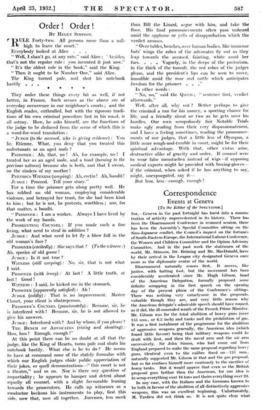Order ! Order !
By HELEN SIMPSON.
e -pp U E Forty-two. All persons more than a mile -1-11 high to leave the court."
Everybody looked at Alice . . .
" Well, I shan't go, at any rate," said Alice ; " besides, that's not the regular rule : you invented it just now." " It's the oldest rule in the book," said the King. • " Then it ought to be Number One," said Alice. The King turned pale, and shut his notebook hastily . « * * * They order these things every bit as well, if not better, in France. Such scenes as the above arc of everyday occurrence in our neighbour's courts ; and the English reader, enthralled, but with the rigorous tradi- tions of his own criminal procedure fast in his inii.d, is all astray. How, he asks himself, are the functions of the judge to be deduced from the scene of which this is a word-for-word translation :.
"JUDGE (to the accused, who is giving evidence): You lie, Etienne. What, you deny that you treated this unfortunate as an aged mole ?
PRISONER : Ah, that, no ! Ah, for example, no ! I treated her as an aged mole, and a toad (turning to the previous witness) because she is both, and that I swear, on the cinders of my mother !
PREVIOUS WITNESS (weeping): Ah, cretin! Ah, bandit ! JUDGE : Proceed. Tell your story."
For a time the prisoner gets along pretty well. He has robbed an old woman, employing considerable violence, and betrayed her trust, for she had been kind to him ; but he is not, he protests, worthless ; nor, for that matter, a bandit.
" PRISONER : I am a worker. Always I have lived by the work of my hands.
. PROSECUTING COUNSEL : If you made such a fine living, what need to steal in addition ?
JUDGE : And what need to let fly a blow full in the old woman's face ?
PRISONER (excitedly) : She says that ? (To the witness :) All, species of old goose !
JUDGE : Is it not true ?
WITNESS (still weeping): No, sir, that is not what I said.
PRISONER (with irony): At last ! A little truth, at last ! Good !
WITNESS : I said, he kicked me in the stomach. PRISONER (apparently satisfied): Ah !
Junon (coldly): That is no improvement. Master Clunet, your client is obstreperous.
PRISONER'S COUNSEL (passionately): Because, sir, he is interfered with ! Because, sir, he is not allowed to give his answers.
JUDGE: Interfered with? And by whom, if you please ? THE BENCH OF ADVOCATES (rising and shouting): Hon, hou! Enough, enough !"
At this point there can be no doubt at all that the judge, like the King of Hearts, turns pale and shuts his notebook hastily. What else is he to do ? He seems to have at command none of the stately formulae with which our English judges chide public appreciation of their jokes, or quell demonstrations—" this court is not a theatre," and so on. Nor is there any question of impartiality ; he appears to hamper and detest about .equally all counsel, with a slight faVourable leaning towards the prosecutors. He calls np witnesses as a conductor beckons his instruments to play, first this side, now that, now all together. Jurymen, less meek than Bill the Lizard, argue with him, and take the floor. His final pronouficCments often pass unheard amid the applause or yells of disapprobation which the verdict arouses.
" Over tables, benches, over human bodies, like immense bats' wings the robes of the advocates fly out us they leap towards the accused, fainting, white amid her furs. . . Vaguely, in the deeps of the pretorium. in the thick of the tumult, the red robes of the judges gleam, and the president's lips can be seen to move, inaudible amid the roar and rattle which anticipates freedom for the prisoner . ."
In other words :
" No, no," said the Queen ; " sentence first, verdict afterwards."
Well, after all, why not ? Better perhaps to give the criminal a run for his money, a sporting chance for life, and a friendly shout or two as he gets over his hurdles. Our own scrupulously fair Notable Trials make ugly reading from their very dispassionateness, and I have a feeling sometimes, reading the pronounce- ments of our judges, that a little less of Olympus, a little more rough-and-tumble in court, might be for their spiritual advantage. With that, other vistas arise, destructive alike of gravity and order. If counsel were to wear false moustaches instead of wigs—if opposing medical experts might be provided with boxing-gloves-- if the criminal, when asked if he has anything to say, might, unexpurgated, say it—
But hou, hou—enough, enough !






































 Previous page
Previous page